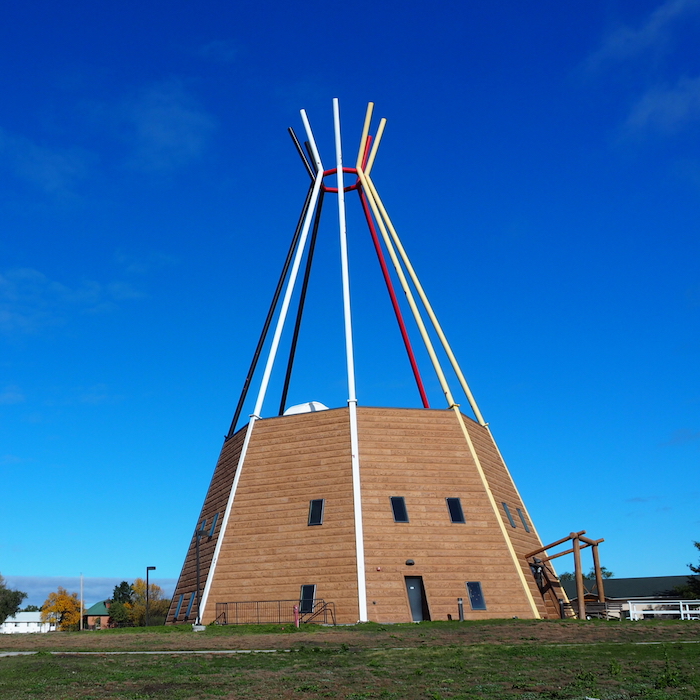Last Monday and Tuesday, I had the chance to spend time at Sinte Gleska University on the Rosebud Reservation (where the Lakota live). Of all the experiences I’ve had so far, it was the most eye-opening. This post series will consist of four posts: a conversation with a group of students, two individual interviews, and my reflection.
This first post is a conversation I had with four students at the university in a class on government. They all asked to remain anonymous, so they are just listed as Students 1 to 4. The conversation touched on people’s need to understand tribal history and the U.S. government’s shortcomings.
Whether they’re good citizens:
Student 1: I am because I’ve never been arrested.
Student 2: Yea, I think given all the negativity we live with, if we stay positive and obey the laws, that makes us good citizens.
Why voting is important:
Student 3: I think it’s important because every vote for counts. I vote for every U.S. election.
Student 2: Voting is important, whether it’s tribal or U.S. government, because it’s going to affect future generations. I wish kids from 18-35 would vote. It’s scary because a lot of this (politics) is based on the future, and young people don’t vote. For example, education cuts really hurt the reservation, and the only way to prevent them is to vote.
Student 4: People have to come together to help each other. We have to help each other survive. The political lifestyle isn’t for me. But I still vote because it’s important to guarantee people get what they need.
On whether they feel more “American” or “Lakota”:
Student 2: I don’t know how to answer it. I like being a Lakota, but when we don’t follow rules, I look to the U.S. for help.
Student 4: I don’t look at the identities as divided. We are all a part of the United States.
Student 3: I never saw them as different things; they’re both important to me.
They’re concerned about whether tribal history will endure:
Student 4: I had Lakota Culture this morning, and the professor has been with the university forever. He now has cancer. Him, and the other Lakota historian on campus, are both sick, and the tribe will lose a lot. They speak seven languages and know almost all of the cultures. Next fall, they’re going to get rid of Lakota history as a class, and it won’t be here for any of the younger generation. It’s kind of scary.
Student 2: But that’s where we come in. I grew up traditionally, speaking the language at home. We need to keep that history alive.
The conversations about the Las Vegas were hard for them:
Student 2: I’ve seen on the news about Las Vegas. Nobody cared when our tribe was massacred. Nobody talked or talks about it. The younger Lakota talk about that shooting. But they should be going back to our own history and talking about what’s happened.
Teacher: When they said it was the biggest mass shooting on the news, I was like, “No it wasn’t.”
Student 2: That’s what I said! It kind of grew anger inside me.
Student 4: I think if they rephrased the way they talk about it, it wouldn’t be a problem. We’ve shown hatred toward people when we don’t pray for them; we know what happened at Wounded Knee. But we still need to show compassion for other people. We can’t show hatred just because they’ve worded things wrong.
The biggest challenges facing the Lakota Community:
Student 3: Alcohol, drug, abuse, domestic violence.
Student 2: Poverty.
Teacher: They all go together. But how do you pick one?
Student 2: The whole umbrella.
Their feelings towards the U.S. Government:
Student 3: I don’t like the government at all. I think not all of them are open-minded.
Teacher: I think it’s hard to feel represented in South Dakota. There are only 3 reps in Washington, and they don’t represent the whole state. They’re all very conservative; it’s hard to see how they help people who aren’t ranchers. People run cattle here, but it’s not ranching.
Student 4: Representatives skip over the reservations and parts of the state.
Student 2: The government could do more. If they want our voters, they should actually help. They should come to the reservation. I have friends from off the reservation who are afraid to come here. We have police and laws here! It just shows that people don’t care.
How they’d like the government and non-indigenous people to interact with the Lakota:
Student 3: People need to stop being racist towards us.
Student 4: Individual people should stop the labeling. What both people and the government could do is help with funding for homes, and treatment centers. Finding homes for our homeless.
What it means to be an American:
Student 1: Boundaries. The reservation has boundaries between what’s America and what’s the reservation. That’s what I’ve grown up and come to understand.
Student 4: To me, it’s about family. It’s about knowing the culture and history. It’s about having that growing up as kids, bonding with your family. Bring those together as who we are, whether we’re Native America or any other culture.
Student 3: I think America has a lot of diversity. We, as Americans, all live here together.
